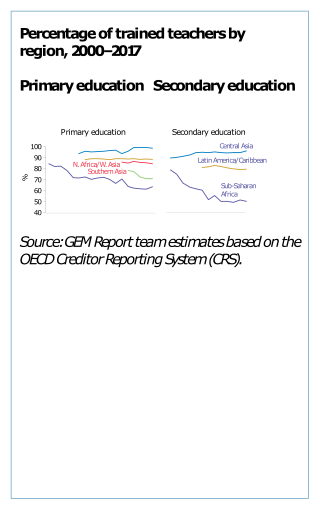
Student-centered learning, also known as learner-centered education, broadly encompasses methods of teaching that shift the focus of instruction from the teacher to the student. In original usage, student-centered learning aims to develop learner autonomy and independence by putting responsibility for the learning path in the hands of students by imparting to them skills, and the basis on how to learn a specific subject and schemata required to measure up to the specific performance requirement. Student-centered instruction focuses on skills and practices that enable lifelong learning and independent problem-solving. Student-centered learning theory and practice are based on the constructivist learning theory that emphasizes the learner's critical role in constructing meaning from new information and prior experience.
Higher education in Mauritius includes colleges, universities and other technical institutions. Public university education has been free to students since 2019. The sector is managed by the Higher Education Commission (HEC) which has the responsibility for allocating public funds, and fostering, planning and coordinating the development of post-secondary education and training. Formerly the Tertiary Education Commission, in 2020 it was reformed into the HEC and a separate Quality Assurance Authority (QAA) for auditing of qualifications.
The Higher Education Funding Council for England (HEFCE) was a non-departmental public body in the United Kingdom, which was responsible for the distribution of funding for higher education to universities and further education colleges in England since 1992. It ceased to exist as of 1 April 2018, when its duties were divided between the newly created Office for Students and Research England.
Lifelong learning is the "ongoing, voluntary, and self-motivated" pursuit of knowledge for either personal or professional reasons. It is important for an individual's competitiveness and employability, but also enhances social inclusion, active citizenship, and personal development.

Open University Malaysia, abbreviated as OUM, is the 7th Malaysian private university and it is owned by the Multimedia Technology Enhancement Operations (METEOR) Sdn. Bhd, a consortium of 11 Malaysian public universities. It leverages on the quality, prestige and capabilities of its consortium.

Open educational resources (OER) are teaching, learning, and research materials intentionally created and licensed to be free for the end user to own, share, and in most cases, modify. The term "OER" describes publicly accessible materials and resources for any user to use, re-mix, improve, and redistribute under some licenses. These are designed to reduce accessibility barriers by implementing best practices in teaching and to be adapted for local unique contexts.

Teacher education or teacher training refers to programs, policies, procedures, and provision designed to equip (prospective) teachers with the knowledge, attitudes, behaviors, approaches, methodologies and skills they require to perform their tasks effectively in the classroom, school, and wider community. The professionals who engage in training the prospective teachers are called teacher educators.
Computer-supported collaborative learning (CSCL) is a pedagogical approach wherein learning takes place via social interaction using a computer or through the Internet. This kind of learning is characterized by the sharing and construction of knowledge among participants using technology as their primary means of communication or as a common resource. CSCL can be implemented in online and classroom learning environments and can take place synchronously or asynchronously.
The Irish Research Council was launched in 2012 and operates under the aegis of the Department of Education and Skills. The core function of the organisation is to support research across a number of disciplines and career stages. The council also has a role in supporting research with a "societal focus", and has established partnerships across government and civic society to this end.
The Re-Engineering Assessment Practices in Scottish Higher Education project, or REAP, is one of six projects funded under the Scottish Funding Council's E-learning Transformation Programme. The project is piloting improved models of assessment across three universities - the University of Strathclyde, Glasgow Caledonian University and the University of Glasgow.
Skills for Life was the national strategy in England for improving adult literacy, language (ESOL) and numeracy skills and was established as part of the wider national Skills Strategy to increase the numbers of young people and adults with adequate skills. The strategy was launched by the Prime Minister, Tony Blair, in March 2001.
Mary James FAcSS retired in January 2014 as Professor and Associate Director of Research at the University of Cambridge, Faculty of Education. In the same year she completed her four-year term as Vice President and President of the British Education and Research Association.
Andrew Pollard is an emeritus professor at the Institute of Education, University College London. Formerly, he was Professor of Education at the universities of Cambridge, Bristol and the West of England, Bristol. He chaired the Education Sub-panel for the 2014 Research Excellence Framework on behalf of UK Higher Education Funding Councils, which involves assessing the quality of research undertaken in UK universities. He was Director of the ESRC Teaching and Learning Research Programme from 2002 to 2009, of the UK Strategic Forum for Research in Education from 2008 to 2011 and of ESCalate, the Education Subject Centre of the UK's Higher Education Academy. He is a non-executive director of William Pollard & Co. Ltd. a print and communications company, founded in 1781 and based in Exeter.

Open education is an educational movement founded on openness, with connections to other educational movements such as critical pedagogy, and with an educational stance which favours widening participation and inclusiveness in society. Open education broadens access to the learning and training traditionally offered through formal education systems and is typically offered through online and distance education. The qualifier "open" refers to the elimination of barriers that can preclude both opportunities and recognition for participation in institution-based learning. One aspect of openness or "opening up" education is the development and adoption of open educational resources in support of open educational practices.
London Knowledge Lab was a research centre in Bloomsbury, London. It was founded in 2004 as a collaboration between the Institute of Education and Birkbeck, University of London. It was an interdisciplinary research centre, bringing together over 50 researchers from both social sciences and computer science backgrounds. The Institute of Education and Birkbeck announced the end of their collaboration in February 2016. Both institutions are continuing the work in their own separate Knowledge Lab research centres.

Marcia C. Linn is a professor of development and cognition specializing in education in mathematics, science, and technology in the Graduate School of Education at the University of California, Berkeley. Since 1970 she has made contributions to the understanding of how computers and technology can be used to support learning and teaching in mathematics and science.

Open educational practices (OEP) are part of the broader open education landscape, including the openness movement in general. It is a term with multiple layers and dimensions and is often used interchangeably with open pedagogy or open practices. OEP represent teaching and learning techniques that draw upon open and participatory technologies and high-quality open educational resources (OER) in order to facilitate collaborative and flexible learning. Because OEP emerged from the study of OER, there is a strong connection between the two concepts. OEP, for example, often, but not always, involve the application of OER to the teaching and learning process. Open educational practices aim to take the focus beyond building further access to OER and consider how in practice, such resources support education and promote quality and innovation in teaching and learning. The focus in OEP is on reproduction/understanding, connecting information, application, competence, and responsibility rather than the availability of good resources. OEP is a broad concept which can be characterised by a range of collaborative pedagogical practices that include the use, reuse, and creation of OER and that often employ social and participatory technologies for interaction, peer-learning, knowledge creation and sharing, empowerment of learners, and open sharing of teaching practices.
Online credentials for learning are digital credentials that are offered in place of traditional paper credentials for a skill or educational achievement. They are directly linked to the accelerated development of internet communication technologies, the development of digital badges, electronic passports and massive open online courses (MOOCs).
Open Educational Practices in Australia refers to the development, implementation and use of Open educational resources (OER), open access, open learning design, open policies, and Massive Open Online Courses (MOOCs) to open up education in Australia.

Tamar Ariav is an associate professor of education and the Academic Director of the Jack, Joseph and Morton Mandel Foundation - Israel l








